Mavros Gatos: A Genuine Neighborhood Taverna Operating in...
Among the many city eateries offering...
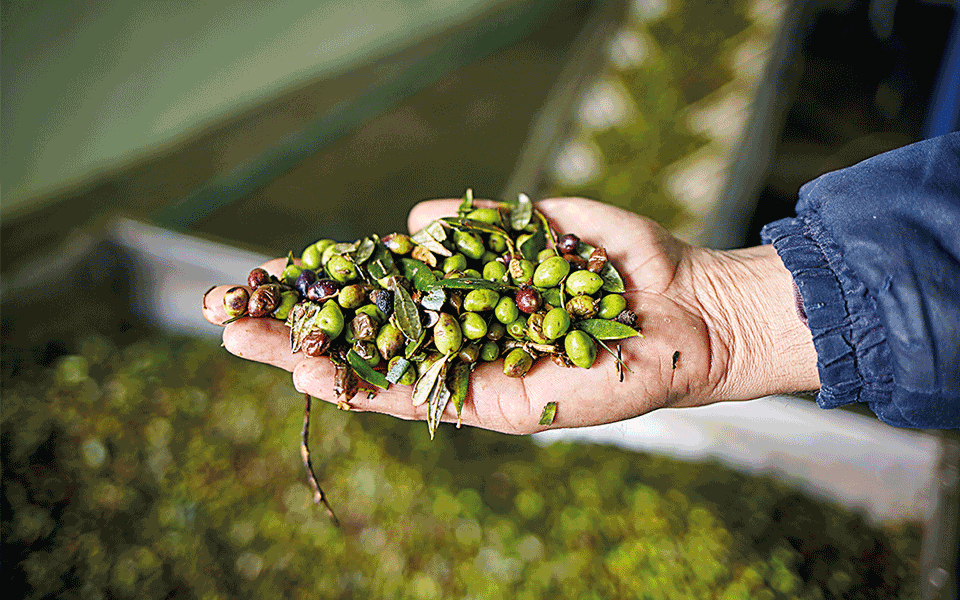
A mix of green and ripe olives makes the best oil.
© George Tsafos
Twenty years ago, the Mediterranean diet, and the Cretan version of it, were making headlines. People who followed a regime based on vegetables, olive oil, grains, greens and pulses were found to live longer and better than dedicated carnivores, fast-food addicts and those who subsisted on processed food. Greeks regularly appeared at the top of longevity lists while magazines featured articles about the country and its blessed green gold: its unadulterated extra virgin olive oil.
In 1997, the Oldways Preservation and Exchange Trust of Boston held a week-long conference in Crete to celebrate the 50th anniversary of the discovery, in a Rockefeller Foundation study, that Cretans, despite the privation of the war years, lived far longer on average than pampered Americans with their fixation on steak, fries and butter. With the help of noted Greek doctors and nutritionists like Dimitrios and Antonia Trichopoulos, the trust had proposed the Mediterranean Diet Pyramid as an alternative to that of the US Department of Agriculture. Their placement of meat at the pinnacle rather than near the base and their suggestion that a glass of wine was a better accompaniment to a meal than a tumbler of milk caused a furor among spokespersons for the meat and dairy industries.

Country bread, made from unbleached flour.
© Angelos Giotopoulos
When I was first smitten with Greece and its food in the 1960s (a condition that still endures), I had no notion of the benefits of what I was eating. I only knew that I’d never been happier sitting around a table. Having been raised on Long Island on an unvarying routine of meat and two vegetables for supper, and sandwiches for lunch, the meals at my sister-in-law’s summer home on Spetses stimulated and soothed my whole being. Whether the pièce de résistance was lentil soup, pot roast with mashed potatoes, tomato and onion salad with fresh plucked basil, zucchini fritters or scrambled eggs with tomatoes, I was in heaven.
The conversation flowed along in English, French and Greek as we sipped barrel-aged retsina; every dish had been prepared with agapi (love) because, as Eleni the cook had told me, “You can’t just toss things into a pan and then leave and go make the beds. You must keep watch. Be attentive. Look after your food till it’s ready.”
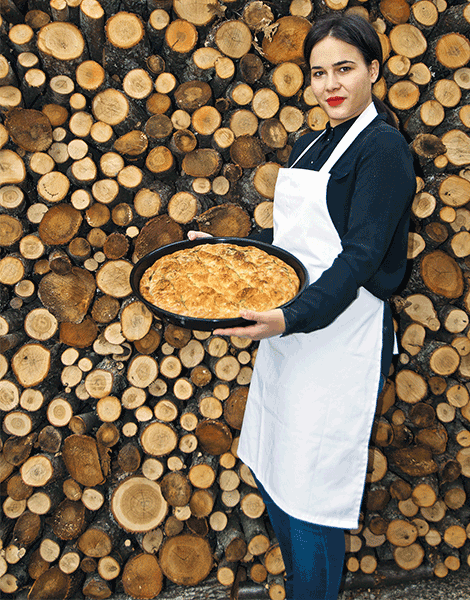
Pita baked in a wood-burning oven.
© Clairy Moustafellou
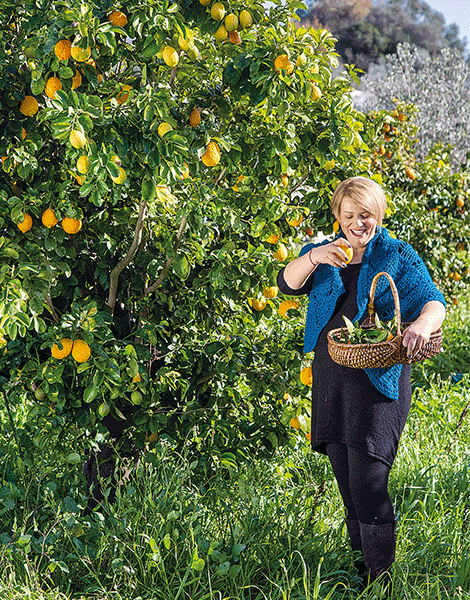
© Perikles Merakos
During the winters back in New York, my Greek husband and I would yearn for what we called “soul food,” not collard greens, chitterlings and grits, but classic Greek dishes: tiny crisp-fried squid, keftedes (mint-flavored meatballs), creamy taramosalata (fish roe dip), oil-rich bean soup, green beans in tomato sauce, stuffed eggplants called “little shoes”, and we would search in vain at the fishmongers for whole shrimp, or for fish that hadn’t been decapitated, because the head helps make the soup taste like soup.
It was only well after I returned to Greece to live in 1972 that I discovered that the country’s food possessed much more variety than the average taverna offered. Travels to Epirus revealed a whole range of pies, some as big as a bicycle wheel, and stews baked in sealed clay pots, while pies in Crete might resemble ancient oil lamps or be as small as ravioli. The Peloponnese boasted fields of artichokes, citrus orchards as far as the eye could see and olive groves that were even larger, as well as pork delicacies, whereas the mountains of Central Greece claimed the best lamb and yogurt and its plains were the country’s breadbasket.
Corfu had dishes that sounded Italian but were seasoned with hot pepper flakes, and Thessaloniki’s markets and restaurants served “unGreek” northern dishes like sauerkraut and myriad types of pickle along with deep-fried mussels like those sold on the streets of Istanbul, as well as a galaxy of spicy foods introduced by refugees from Asia Minor and the Pontus region.
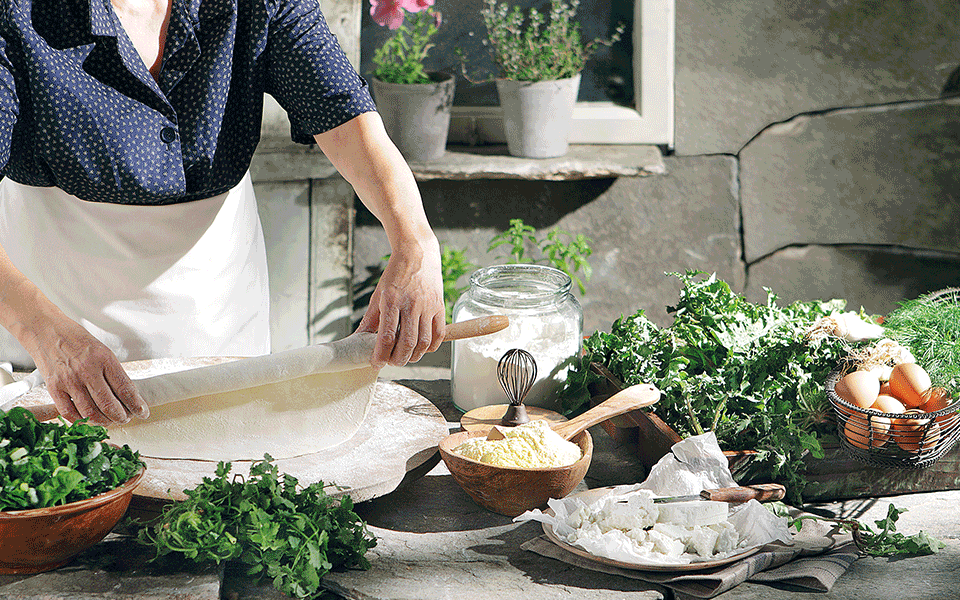
All the fixings for a fine pie made with greens.
© George Drakopoulos
Before the 1990s, if you didn’t travel, you had to have a grandmother from these places in order to even know regional specialties existed. Now tavernas serving them are scattered around Athens, while groceries dedicated to the foods and beverages of different areas bring an astonishing wealth of tastes to the capital, from fresh produce, much of it organic, to pastas, sauces, relishes, cured meats and fish, cheeses and sweets.
This abundance takes one back to Archestratos, a poet, gourmand and culinary expert who lived in the Greek colony of Sicily in the 4th century BC. Many of the fragments that remain of his Life of Luxury extol local delicacies – the eels of Lake Kopais (now drained), the whitebait of Faliro Bay, the bread and cakes of Athens. Likewise, I dream about the bottarga of Messolongi, the tomatoes of Santorini, the sardines of Lesvos, the red peppers of Florina, the sausages of Didymoteicho, the capers of the Cyclades, the beans of Prespes, the pastourmas (air-cured beef) of Drama, the extra special potatoes of Naxos … and the cheeses of just about anywhere.

Picking grapes the old-fashioned way produces the best results.
© Perikles Merakos
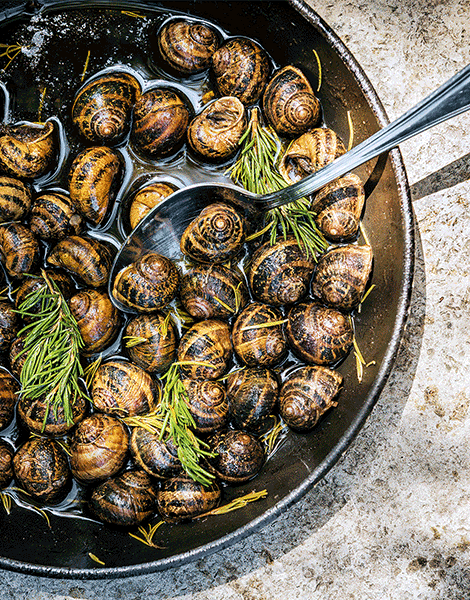
Cretan snails are known as “boubouristous,” named for the bubbling sound they make while cooking.
© Dagmar Schwelle/Laif
Yet another feature of Greek cooking that is as true today as it was in antiquity is its focus on straight-forward tastes and on quality ingredients eaten in season. Whereas the Romans loved to dazzle guests by mixing pearls with lentils or gilding a roast with gold leaf, Greek chefs (in as great demand then as French chefs in the modern era) relied on the excellence of their produce and judicious seasoning with herbs – oregano, mint, parsley, rosemary, savory – but rarely spices. As they still do. Symposiasts felt it was better to get up from a banquet still a bit peckish; they would have been aghast at the idea of a vomitorium.
The motto of the day was moderation in all things (pan metron ariston).
Today, moderation may an ideal “more honored in the breach than in the observance,” but there’s one feature of the Greek way of eating that sets it apart from almost every other country: the rules set down by the Orthodox fast. Of course, observing dietary rules during the church calendar’s four fasting periods, numerous saints’ days and Wednesdays and Fridays isn’t as widely practiced as it used to be. But the prohibition of dairy, meat, eggs and even fish – any food from an animal that has a backbone – meant that hundreds of recipes were devised over the centuries to make vegetables, grains, pulses and greens more tempting to hungry families. And they’re so much a part of Greek culture that all but the most dedicated carnivores appreciate them.

Eggs with smoke-cured pork.
© Perikles Merakos
According to Antonia Trichopoulou, president of the Hellenic Health Foundation, this focus on vegetables makes the Greek version of the Mediterranean diet a bit healthier than its counterparts around the Mare Nostrum. And it’s also in accord with Michael Pollan’s dictum in his In Defense of Food: “Eat food [not processed stuff with ingredients you can’t pronounce]. Not too much. Mostly plants.”
But to me, apart from its nutritional aspects and regional delights, the healthiest aspect of the Greek way of eating remains the leisurely savoring of food (preferably cooked with love) with friends and family. Lingering over a meal – undistracted by televisions or smartphones – and enjoying good conversation and each others’ company are just as beneficial to the mind and soul as they are to the body. And in Greece, most of the time, this is still the preferred way of getting together, whether you’re in town or country, on a mountain or by the sea.
In 2009, Oldways revised their original “pyramid,” making this social interaction part of the foundation for healthy mealtime behavior. Unless you have a specific condition, like celiac disease or lactose intolerance, there’s no need to follow each new, restrictive fad diet. Just remember that the word “diet” comes from the Greek diaita, which originally meant a way of life, a balance between eating, working, movement and relaxing.
Diana Farr Louis is a travel writer and expert in Greek cuisine. She is the author of several guidebooks and cookbooks dedicated to Greece available here.
Among the many city eateries offering...
Beyond souvlaki lies a carnivore’s paradise,...
Discover Crete’s iconic sarikopites – delicate...
Three traditional products serve as both...